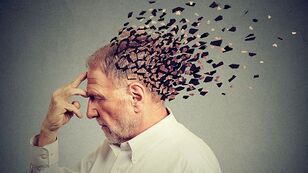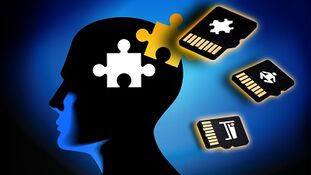
There are completely opposite opinions about medications for improving memory. Some say it is helpful and helps to cope with increased intellectual stress, that it really helps and effectively.
Others say it’s just a myth that there’s no benefit to taking these drugs, that it can even be harmful and addictive to these drugs. Let’s try to consider both approaches in more detail and find out what’s right.
A little about memory
Memory is a mental function of higher nervous activity that helps to store, store, and reproduce previously received information. Memory allows long-term storage of information about the outside world or the body's reactions to any effects, as well as allows this information to be used for the correct organization of activities in the future.
Memory includes several different but related processes.
- Memo- introduction of new data, sensations.
- Storage- storage of data, senses includes their processing and assimilation. This process allows a person to learn, develops his thinking and language.
- Reproduction and recognition- actualization of past elements, actions, sensations. Reproduction is forced (elements "float" in a person's mind without his will and effort) and arbitrary.
- Forgetting- Losing the ability to reproduce and recognize previously memorized items. This can be temporary or permanent. Incompletely forgotten when information is recovered or recognized in error or in part.
Basic memory types
There are many types and subtypes in a memory classification. Let’s talk about its main types.
- Sensory memory- storing information from the senses by stimulating them.
- Touch memory- Preserving information from receptors by touch.
- Engine Memory- When storing motion information, many may remember that there are movements they perform automatically.
- Semantic Memory- Storing factual information such as learned stories, dates, multiplication tables.
- Short-term memory- Information stored for a short time. Has a small volume.
- Long-term memoryis the storage of information indefinitely, including for life.
Laws of Memory

Few people know that there are many laws of memory. This is not the author's invention, but realistically established and scientifically validated models.
- Law of Repetition- Information is remembered much better if it is repeated several times.
- Law of Interest- If a person is interested in information, he will remember it faster and better.
- Edge Law- The information at the beginning and end is best remembered.
- Law of Understanding- If the information has been deeply understood, then it will be better remembered.
- Law of optimal line length- the amount of information to be stored must not exceed the short-term memory.
- Installation Law- A person who has given himself an installation that needs to remember this or that information will remember it faster and better.
- The Law of Suppression- by remembering similar concepts, the old information "coincides" with the new.
- Context Law- Remembering things that can be associated with familiar concepts happens faster.
- Law of Action- If what is memorized is used in practice, then memorization is more efficient and faster.
These laws can be used if you want to remember something faster and better, as well as to develop memory.
Causes of memory loss
- Organic brain damage- acute cerebrovascular disorder, traumatic brain injury, brain tumor.
- Diseases of other organs and systems- Diseases of the liver, cardiovascular system.
- External factors- bad ecology, significant change in the surrounding conditions of existence, stress, sleep disorders.
- Age-related changes in brain structure- Decreased number of interneuronal connections.
- Chronic poisoning- smoking, drug use, drug abuse, alcoholism, drug abuse (sedatives, sedatives).
Treatment of memory disorders
Medications are not given immediately if memory needs to be improved. First, they try to apply non-drug methods. This includes:
- Brisk walks in the fresh air. This increases the access of oxygen to the brain. This improves the efficiency of his work.
- Normalize sleepand alertness.
- Evening workouts- The habit of remembering all the events of the day in reverse order, that is, first of all, remembering what happened in the evening and eventually the morning events, can become an unusual workout. It is better to do this before going to bed while lying in bed.
- Positive attitude, don't try to support it- don't think you have a bad memory, nothing has eliminated the effects of self-hypnosis. If at some point you can’t remember something, then don’t worry, don’t get angry, but just get distracted, do something else and try again to remember what you forgot.
- Daily workouts- solve crossword puzzles, puzzles, crawls.
- Education- learn poetry, foreign languages, do it regularly, gradually increase the amount of material taught.
Medications for memory loss

It is obvious that learning poetry, a foreign language, solving puzzles is not easy, you need to "get tense", you should spend extra time walking and solving puzzles, which a working person practically does not have.
It's much easier to take a pill, calm down and expect the magical power of the drug - your memory will instantly improve and you won't have to do anything! The modern city dweller is so lazy and spoiled by the fruits of civilization that now few people are so purposeful and willing to devote time and energy to memory development. So a person is looking for an answer to their question - what are memory enhancement pills?
So let's consider two opposing views on this issue:
Positive Opinion
Proponents of the use of these funds argue that many drugs help improve the blood supply to brain cells, thereby improving their nutrition and supplying more oxygen, which improves metabolic processes in neurons.This is aided by nootropic drugs and drugs that improve the rheological properties of the blood.
Herbal preparations have spread, which not only improve the metabolic processes in neurons, but also enhance the effects of nootropic drugs.
However, it should be borne in mind that any (absolutely any) medicine has its own contraindications and side effects, so it should be prescribed by a doctor only in each specific clinical case.
Negative opinion
According to many experts, there is also a shortage of coins. A few years ago, experts were puzzled by the question - are these drugs effective, or is it just a placebo effect?
Efficacy of nootropics has not been demonstrated in numerous studies. There is no evidence that they have a positive effect on memory. One of the small studies of the effectiveness of the medicines showed that their effects were small, but not in severe cases.
Traditional methods and herbal preparations such as ginseng, vitamin E, have virtually no research. The evidence base is only for the use of herbs in patients with dementia. However, no data are available on efficacy in relatively healthy subjects.
In closing, I would like to say that when thinking about what medications improve memory, remember that they should be prescribed by a doctor. In addition, the doctor should also evaluate the effectiveness in each case. Do not rely on the advice of friends, neighbors or relatives.
If you think your memory has deteriorated, consult a neurologist. Maybe it’s not a problem at all, it can be distracting, there can be other problems. It is also necessary to find out the cause of this condition. And this can only be done by a qualified doctor.









































































